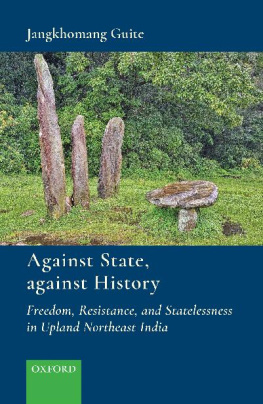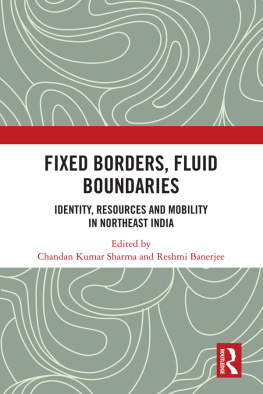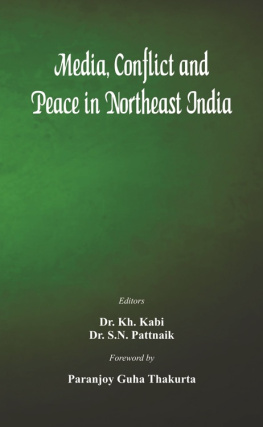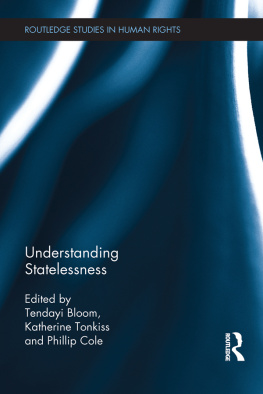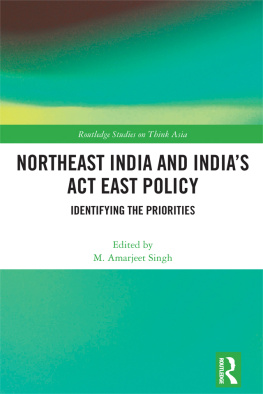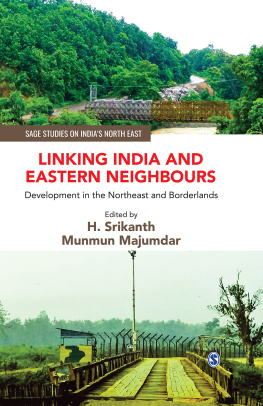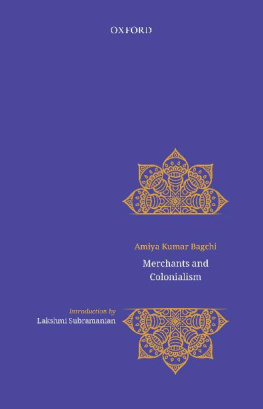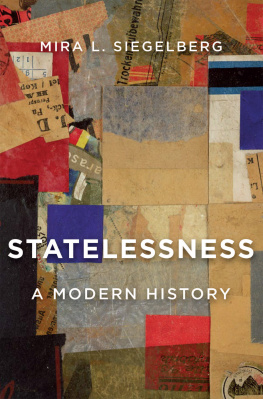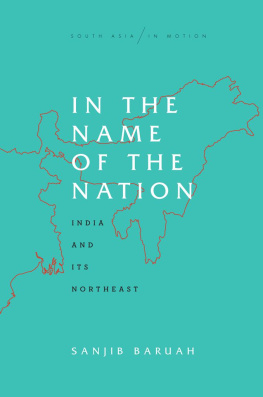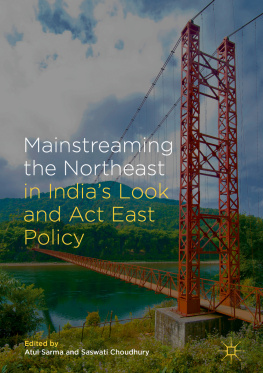Against State, against History
Against State, against History
Freedom, Resistance, and Statelessness in Upland Northeast India
Jangkhomang Guite
Oxford University Press is a department of the University of Oxford.
It furthers the Universitys objective of excellence in research, scholarship,
and education by publishing worldwide. Oxford is a registered trademark of
Oxford University Press in the UK and in certain other countries.
Published in India by
Oxford University Press
2/11 Ground Floor, Ansari Road, Daryaganj, New Delhi 110 002, India
Oxford University Press 2019
The moral rights of the authors have been asserted.
First Edition published in 2019
All rights reserved. No part of this publication may be reproduced, stored in
a retrieval system, or transmitted, in any form or by any means, without the
prior permission in writing of Oxford University Press, or as expressly permitted
by law, by licence, or under terms agreed with the appropriate reprographics
rights organization. Enquiries concerning reproduction outside the scope of the
above should be sent to the Rights Department, Oxford University Press, at the
address above.
You must not circulate this work in any other form
and you must impose this same condition on any acquirer.
ISBN-13 (print edition): 978-0-19-948941-1
ISBN-10 (print edition): 0-19-948941-6
ISBN-13 (eBook): 978-0-19-909415-8
ISBN-10 (eBook): 0-19-909415-2
Typeset in Adobe Garamond Pro 10.5/12.5
by The Graphics Solution, New Delhi 110 092
Printed in India by Rakmo Press, New Delhi 110 020
The maps in this book do not claim to represent the authentic domestic or
international boundaries of India. They are not to scale and are provided for
illustrative purposes only.
To
Jennifer Guite
For her love, patience, and endurance
Contents
Figures
Table
| ASA | Assam State Archives |
| EB&AS | East Bengal & Assam Secretariat |
| FE | Foreign Department, External Proceedings |
| FP | Foreign Department, Political Proceedings |
| JP | Judicial Proceedings |
| NAI | National Archives of India |
| PP | Political Proceedings |
| sq km | square kilometre |
| WBSA | West Bengal State Archives |
This book has been long in the making. It took toils to see some light at the end. It has always been my wish to write on the hill tribes of Northeast India not because I am obsessed with them but, more importantly, due to the way we have generally understood them. Two trends on the writings of the history of Northeast India have been disturbing me for a long time. On the one hand, the history of Northeast Indian tribes roughly begins with colonial period as if no history of them prior to that can be written. Thus, we have two sets of the tribal paststhe written and the spoken/oral, the history and the myth, the state and the stateless. On the other hand, the written history of the hill tribes has been largely influenced by the dominant civilizational discourse on the tribe. Our heretical view on orality, obsession with written sources, lack of interrogating the interrogators, and failure to read the written against the grain are central. The hold of dominant civilizational narratives is so strong and its epistemic violence so powerful that it is not easy to unwind them. They are so internalized that the hillmen felt so low of themselves as if the chilli plant is too big to climb.
A few path-breaking studies in recent time have provoked this book. It is always easy to criticize the dominant colonial discourse but it is very difficult to provide any alternative explanation. Besides others, James C. Scott has recently shown us the way to circumvent the dominant civilizational discourse on the tribe. He laid the path through which we may be able to see the history of the hill people differently and in the right perspective. To be sure, putting his boot across the rugged mountain massif is not only easier to traverse but also most fascinating one to experience. This book is the first of a series I have in mind on the history of upland Northeast India. It concerns the period when the hills were in a state of statelessness. I hope to defocus, decentre, and recast their history from the counter-perspectives of the margin and in the light of recent historiography, noted earlier, that presented the highlanders as state-evading population in the hills.
Although this had been always a long wish, I seriously began my research on it nine years back. It was a long struggle but a rewarding one. The pains are far compensated by the fascination one discovers at the forgotten fringe. My entry into this academically dark-side was making a good start with my colleagues at the Assam University, Silchar. Their hard-gained knowledge about this margin through a long research was a concrete foundation on which I began. After all, a well beginning is half done. I cannot mention all their names here but my sincere gratitude is to all of them. But of these glittering, Sajal Nag deserves a particular distinction to me. He was the one who stood beside me all the time, listening patiently of my boring (but exciting for me) arguments. He had corrected me on many counts and fattened my knowledge about the region on various counts. He was and is always a big brother as a close friend. Suryasikha Pathak was always with us, whose criticisms are always valuable to me.
I would like to acknowledge here the contribution of a great number of friends whose comments, suggestions, and criticisms helped me during the writing of this book. Some actually read my earlier papers, some wrote to me by mail, and many of them gave me their precious time over the phone. Although I cannot mention all the names here, I extend my sincere thanks to all. Of these, I cannot escape mentioning a few names: David Zou, H. Khamkhansuan, Pum Khan Pau, D.L. Haokip, Amarjit Sharma, Roel Hangshing, Robert Haokip, Bijoy Kumar, Pauthang Haokip, Bijen, Moses, Teiborlang, Joy Pachuau, Gunnel Cederlf, Tiplut Nongbri, and Sarah Hilaly. I have also benefited from various insightful comments and suggestions I received from the participants of different seminars and conferences where I presented parts of this book. Yet, I am solely responsible for this book, for any of its shortcomings and failures.
My colleagues at the Centre for Historical Studies have been a constant source of inspiration, although my association with them was quite recent. Since this manuscript had been submitted for publication before I have had the opportunity to engage with this huge intellectual storehouse of knowledge, I can only repent for being deprived of their valuable inputs which would have made this book much better than it now is. However, their parental support over my teaching schemes and research at the centre was an important source of strength during the last leg of this work.
I am also thankful to the officers and staff of the National Archives of India (NAI, New Delhi), West Bengal State Archives (Kolkata), Assam State Archives (Dispur), and the various tribal research institutes of different states in Northeast India. I am also grateful to the staff of different libraries in Assam University, North-Eastern Hills University, and Nehru Memorial Museum and Library. There were also several people with whom I was closely engaged during my fieldwork for collecting oral sources and some primary data. I am thankful to all of them.

